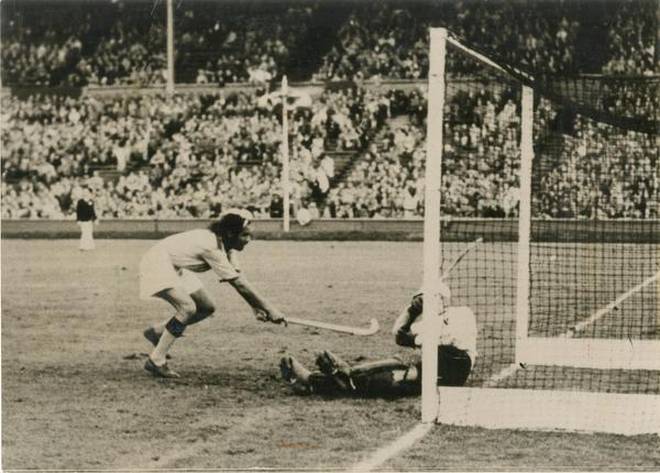Indian hockey is symbolised by two iconic names – Dhyan Chand and Balbir Singh (Sr). Dhyan Chand, winner of the gold in 1928, 1932 and 1936, is remembered every year when August 29, his birthday, is celebrated as the National Sports Day.
Balbir too won the gold thrice in succession – 1948, 1952 and 1956. The nation reaches out to him whenever the Indian team excels in world hockey.
Sadly, the career of neither has been captured in the form of a documentary or a feature film. Suddenly the focus is on hockey, and Balbir, because Gold, starring Akshay Kumar in the lead role, hits the screens nationwide today, bringing to this generation of youngsters the story of India’s epic triumphs at the London Olympics in 1948.
India was not even one year old when the team, led by Kishan Lal, stood under the National Flag at the majestic Wembley Stadium, celebrating the country’s domination in hockey. Often referred to as the national game of India, hockey has lost much of its sheen and glamour to cricket, badminton, and tennis even though it has been kept alive by the sustained efforts of the government.
India’s first Governor General, C. Rajgopalachari, shakes hands with Singh on the team’s return
India’s first Governor General, C. Rajgopalachari, shakes hands with Singh on the team’s return
In my many interactions with Balbir, the last one in March, he has never failed to undertake an emotional trip to London 1948, recalling some stirring moments. “The flag. My eyes still become moist when I remember that glorious day when we beat England in the final. We had mastered our masters.”
The team, with a ‘royal’ allowance of five rupees a day, flew to London with the wishes of the country and took the sea route – 26 days on the water – after becoming the champion. “It was as if the entire country had come to welcome us,” Balbir mumbles.
His frail frame today reflects the state of the game in the country – the last Olympic gold had come at Moscow in the depleted Games of 1980. His memory, however, has remained sharp, as he recalls the moves that brought India the four goals.
The London Olympics, with the city still recovering from the ravages of the World War, were the first to be televised and was also known for its austerity. But India returned rich, wearing the hockey crown.
The final was played on a slushy field – those were days when the game was contested on natural grass – but India found ways to tackle the challenge. At one stage, Kishan Lal and KD Singh Babu played barefoot.
Balbir says the team was received at the airport by Sir John Bennett, a police officer known to him. “You can’t afford to wait for the ball. You will have to go for it and move with it,” Sir John had advised. Balbir acknowledges that priceless piece of counsel.
The England captain Norman Borrett was quoted, “I did not think they were going to have such a victory on the ground so unsuited to their play. But tonight showed how magnificent they are under any condition.”
The team was feted on its return by the bigwigs of the nation – President Rajendra Prasad and Prime Minister Jawaharlal Nehru.
Balbir was the only player from Punjab in that team which drew seven members from Bombay. Flamboyant hockey characterised the team, which had two managers – Pankaj Gupta and AC Chatterji.
The victorious Olympic team played a match at the National Stadium where Balbir scored the lone goal. Nehru was among the audience and reportedly backed the idea of an Asian Games. Delhi hosted it at the same venue three years later but hockey did not find a place in the schedule.
For Balbir, the memories of the 1948 win, relived in Gold, are unforgettable prizes from his career. And of course, the privilege to meet Prime Minister Nehru without “appointment.”
The 1948 Indian team: Kishan Lal (captain), Ranganathan Francis, Leo Pinto, Walter D’Souza, Tarlochan Singh Bawa, Akhtar Hussain, Randhir Singh Gentle, Kunwar Digvijay Singh ‘Babu’, Keshav Dutt, Amir Kumar, Maxie Vaz, Leslie Claudius, Balbir Singh, Patrick Jansen, Latifur Rehman, Lawrie Fernandes, Gerald Glacken, Reginald Rodrigues, Grahanandan Singh, Jaswant Singh Rajput.
Blend of fact and fiction
When we mastered the masters
Akshay Kumar, who plays Tapan Das, the enthusiastic manager of the Indian hockey team, in the Reema Kagti film, says Gold is not a biopic. “The characters and incidents are a blend of fact and fiction but the basic premise has been taken from real events.”
“Covering a time period between 1936 and 1948, it has a patriotic undertone but it relies on cinematic moments and doesn’t get preachy.” Akshay admits he did not play hockey during his growing up days. “But I used to follow the game during the Asian games and the Olympics. Things are changing as we are getting medals in big events. And I am happy that there is a shift towards sports-based dramas like Sultan, Dangal and Soorma. For me, every game is a national game.”
On playing a Bengali character, Akshay says as an actor, one just has to make a character sketch in the head. “I got the accent easily as I worked in Bengal for two years.” He quips that he got into the character once he wore a really long dhoti. “50 to 60 % of work is done when you are in the character’s attire and hairstyle. I realised it when I played a sardar in Singh is King.”








